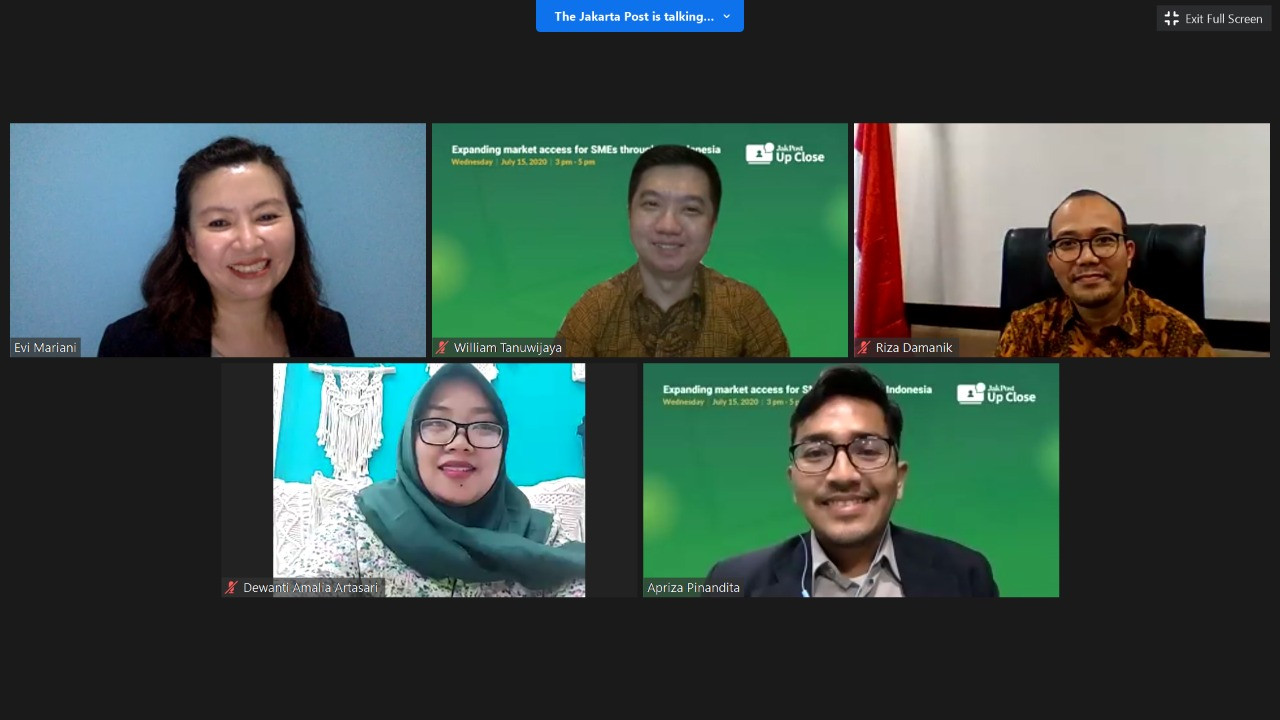Popular Reads
Top Results
Can't find what you're looking for?
View all search resultsPopular Reads
Top Results
Can't find what you're looking for?
View all search resultsE-commerce brings in new entrepreneurs, expands market access in times of crisis
Tokopedia has around 8.3 million SMEs on its platform today and most of them were first-time entrepreneurs.
Change text size
Gift Premium Articles
to Anyone
 (Clockwise, from upper left) The Jakarta Post managing editor Evi Mariani, Tokopedia founder and CEO William Tanuwijaya, expert staff member to the Cooperatives and SME Minister Riza Damanik, The Jakarta Post journalist Apriza Pinandita and Dewa Collection Bali owner Dewanti Amalia Artasari pose during a webinar as part of the Post's JakPost Up Close series titled Expanding Market Access for SMEs Throughout Indonesia on Wednesday, July 15, 2020. (JP/est)
(Clockwise, from upper left) The Jakarta Post managing editor Evi Mariani, Tokopedia founder and CEO William Tanuwijaya, expert staff member to the Cooperatives and SME Minister Riza Damanik, The Jakarta Post journalist Apriza Pinandita and Dewa Collection Bali owner Dewanti Amalia Artasari pose during a webinar as part of the Post's JakPost Up Close series titled Expanding Market Access for SMEs Throughout Indonesia on Wednesday, July 15, 2020. (JP/est)
M
any Indonesians are trying to be entrepreneurs to keep making money via e-commerce platforms amid the economic downturn caused by the unfolding COVID-19 pandemic. Unequal internet access and digital literacy, however, will be major roadblocks to progress, experts say.
E-commerce unicorn Tokopedia, which was one of Indonesia’s start-ups with a valuation of over US$1 billion, reported Wednesday it had around 8.3 million small and medium enterprises (SMEs) on its platform today, and most of them were first-time entrepreneurs.
“Their first business started with Tokopedia,” William Tanuwijaya said during The Jakarta Post’s webinar “Expanding market access for SMEs throughout Indonesia” on Wednesday.
“With a digital platform like Tokopedia, we can expect that more and more SMEs will rise and, with lots of entrepreneurs, lots of job creation will also happen.”
Tokopedia, which accounted for 1 percent of Indonesia’s economic growth last year, connects small businesses with 90 million potential customers that visit the platform every month.
The government aims to have 10 million micro, small and medium enterprises (MSMEs) go digital by the end of the year to help them ease the financial burden of the pandemic. It is aimed at increasing the share of SMEs that have digitalized their businesses, which currently stands at 13 percent of around 60 million small businesses.
Many SMEs, especially those that have not digitalized their business, are suffering losses due to the COVID-19 pandemic, which slowed Indonesia’s economic growth to 2.97 percent in the first quarter of 2020, the weakest in 21 years. A Mandiri Institute survey shows 42 percent of offline MSMEs have stopped operating, compared to 24 percent for online MSMEs.
The main challenge for MSMEs to go online is internet infrastructure to support operations. Out of 83,218 subdistricts and villages, 15 percent are not covered by 4G broadband cellular network, according to data from the Communications and Information Ministry. Most of the subdistricts and villages are the left behind, foremost and outermost areas, called 3T.
Rizal Damanik, an expert staff member to the Cooperatives and SME Minister, said most SMEs were based on Java island, suggesting that other regions still lacked basic infrastructure to facilitate adequate internet coverage.
Merchants on Tokopedia represented 97 percent of districts across Indonesia, said William. The remaining 3 percent are likely to be very remote areas in the middle of mountain ranges.
“This is an opportunity for us to be more aggressive in scaling up our SMEs with digitalization,” Rizal said. “This is the way that we can address economic inequality.”
Rizal said the government was currently drafting a national strategy to grow Indonesian small businesses by pushing them to go digital and integrating the policymaking of 18 related ministries. The draft was expected to be finished this year, he added.
Small business owners accounted for 7 percent of the eligible recipients of the Preemployment Card, the government’s social assistance and skilling program, according to a survey in June by the National Team for Accelerating Poverty Alleviation (TNP2K).
For Dewanti Amalia Artasari, who operates a small home décor online shop from Bali, government aid has yet to reach her, but she continues doing business anyway in the hope that it can get more people employed.
“I just wish the government would understand us. I'm happy when I see people in my village are working. It's a pandemic but people are still productive. I have a lot of orders and I want to have an impact on my surroundings,” said Amalia, who started her business with Tokopedia in 2017.
Amalia said her business booked an increase of 400 percent in sales compared with normal times as she can reach customers throughout Indonesia with e-commerce and social media platforms.
“I resigned from my job and started focusing on Tokopedia,” said Amalia. “My main capital was a mobile phone and an internet connection. I love online selling because I can have more time.”
Amalia is not alone. One in five young entrepreneurs were new to e-commerce platforms, according to a June survey of 2,200 entrepreneurs by Sea Insights. The study found that 50 percent of business owners saw an uptick in the use of digital media — such as social media, e-commerce and online learning — for their operations during the pandemic. However, 63 percent of 2,200 business owners who participated in the survey said it had been difficult to work from home due to, among other things, unstable internet connection.
Editor's note: This article has been updated to revise the figure in paragraph five to 90 million potential Tokopedia customers, not 19 million.









